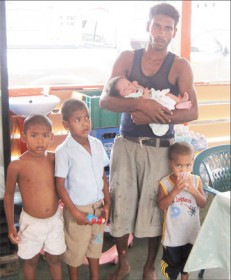When Mohan Geer talks about a life filled with pain, he doesn’t exaggerate. In a blitz of unfortunate events in May that he calls “too cruel,” Geer lost his wife Mary Sandy to an accident and shortly after his four children to childcare services. It all happened in less than 24 hours.

He speaks about his pain casually but there is misery stitched into his face and cracking in his voice. The life he lived prior to his misfortunes is the kind of horror story people rarely want to talk about, but he frankly admits that he “messed up, lived rough” and was irresponsible for an important period in his life. It was during this time that his wife struggled to raise four children without crucial support from him.
Since Sandy was killed and he was stripped of his children, Geer’s life has been up for discussion. At least he sees it that way. He is aware that people, including his immediate neighbours, have thrashed his character and called him everything from a bad father to an abusive husband.
He said that some of the information out there about him is false. “I used to do all kinds of things, but I ain’t a bad father. I use to provide for me kids and me wife could tell you that but she ain’t here to talk and I would not try to invoke her memory for that,” Geer tells Stabroek News.
He is fairly educated though he had little schooling. He chalks it up to “street sense.” He defended his character, saying he has made mistakes the average person makes and maybe some more. But he rejects statements about him leaving his family to suffer, particularly his children.
In their best
interest
As Geer mentions his children he tears up, apologises then continues to clear his name. He blurts out minutes later his fear that his children might forget him. He tries to explain that he understands why the state has taken them, objecting to the use of the word “rescued.” The way he sees it, they were taken not rescued—though taken in their best interest.
The Ministry of Human Services and Social Security has informed him that his children are likely to be in protective care for another year though some discussions have commenced about them being placed in foster care. He is against the idea of someone taking care of his baby boy, Andrew, who is now five months old.
His other three boys are, Andre, four years old, Tyrone, three years old, and Anthony, two years old. He managed to remain calm while discussing them being placed in foster care. “I wouldn’t see me children if people adopt them.
How I suppose to say yes to that?” he questioned, then sought clarification on what foster care really means. Even with an explanation of the foster care programme he was against the idea of someone taking his baby.
Geer, however, admits that he is in no position to care for the children, especially the baby saying that he is without the means. The one-bedroom wooden shack that he built to house his family has been termed an unsuitable living environment for the children by the authorities and he accepts this. He is now working to improve it and proudly displayed a section of the tiny shack where extension works are underway.
Staying clean
He also speaks honestly of accusations that he constantly hit his wife during their union and about his drug addiction. He says he hit Mary a few times but denies that it was all the time. The beatings were not excessive, he claims.
As for his addiction to marijuana, he says it happened during his years of living with Mary’s extended family in the interior. “I get introduce to dis thing there,” he claims. He professes to staying clean for three months and that he has since turned to cigarettes. “If I de smoking, you would know,” he says, “I does look different than how I looking now.” He adds that people still offer him “weed” because of his previous addiction but tells that he responds by saying “cigarette cheaper.”
To confirm his story, Geer calls a neighbour who has been vocal about his inability to care for the children. He tugs at her to say something. “He is trying,” she says. She means that he is working on his recovery but still has a far way to go. “He is like a fish out of water when he on drugs, we does know but he got a cigarette now and then. He trying but he got so much work to do, plenty work,” the woman relates.
The woman discloses that just a day prior to the interview she had accompanied Geer to visit his children. She later directed him to the home where his baby is since it was a different location, but he was unable to find the place. She describes the moment with the older boys as an emotional one, saying that the three older boys were happy to see their father.
She says the children are in good hands “where they need to be at this time,” adding that it is important that the state continues to watch over them. “I told him those children are good and he has to understand that though he is hurting, he must,” the neighbour states.
Geer just wants to see them and know that they are still his children. He is fearful that foster care might erase him as the father in their lives. But as the neighbour interjects by saying that the older children already know him as “daddy,” he nods and says he is okay with that as long as it is made clear.
He spends less time in the city now and is working full-time in the interior, and according to him the goal is to “try and save up money and get better for me children.”




